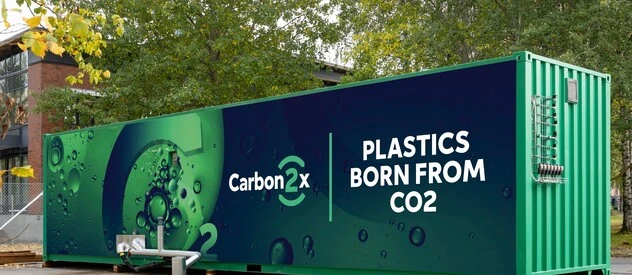In a pioneering development, Fortum Recycling & Waste, a Finnish leader in waste management and circular solutions, has successfully produced biodegradable plastic using carbon dioxide (CO2) emissions from waste incineration. This breakthrough, achieved at their plant in Riihimäki, Finland, marks a significant advancement in the field of carbon capture and utilisation (CCU), aiming to reduce and repurpose industrial CO2 emissions.
Tony Rehn, Head of the Carbon2x program at Fortum, expressed pride in their team’s achievement, stating, “I am very proud that our team is the first in the world to successfully produce biodegradable plastic entirely from carbon dioxide emissions. This breakthrough is a significant step towards more sustainable plastic production.” Rehn emphasised that this innovation offers a new sustainable raw material for the plastics industry, helping to lessen reliance on fossil-based resources and encouraging the growth of circular economy-based businesses.
While several carbon capture initiatives are currently being explored across various industrial sectors in Finland and globally, many of these projects focus primarily on synthetic fuels and carbon capture and storage (CCS). Rehn highlighted the importance of utilising captured carbon dioxide rather than simply storing it underground or releasing it into the atmosphere. He asserted that using captured CO2 represents a more sustainable approach to addressing future resource scarcity, as opposed to the linear model of CCS, which fails to tackle the growing issue of material shortages.
The Carbon2x program, launched in 2022, aims to capture emissions from the incineration of non-recyclable waste and convert them into sustainable products, including biodegradable plastic. Every year, Europe generates approximately 100 million tonnes of non-recyclable waste, a significant portion of which is incinerated for energy production. According to Rehn, implementing innovations from the Carbon2x program could potentially capture and repurpose up to 90% of CO2 emissions released from waste incineration.
Plastic remains a versatile and essential material in sectors such as food packaging and consumer products. However, Rehn noted the urgent need for sustainable alternatives to traditional plastics to complement the current offerings of recycled and bio-based materials. He explained that CO2-based biodegradable plastic matches the qualitative properties of conventional fossil-based plastics, providing a promising alternative for the market.
“We want to promote the circulation of materials comprehensively,” Rehn stated, expressing optimism about the emergence of a new category of sustainable plastics alongside ongoing mechanical recycling efforts. The biodegradable plastic produced from CO2 can be recycled similarly to other plastics, effectively closing the carbon cycle. An additional advantage is its environmental impact; if it inadvertently ends up in nature, it decomposes without leaving harmful microplastics behind.
Rehn anticipates that the Carbon2x program’s innovations will provide solutions not only for packaging in food and cosmetics but also for sectors like toys and home electronics. If the current rate of development continues, industrial production of biodegradable plastic derived from waste incineration CO2 emissions could commence by the end of the decade. Furthermore, a new brand of “plastics born from CO2” is expected to debut in the European market in November 2024. More information about the Carbon2x project: https://fortum.com/carbon2x

